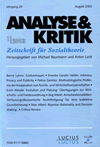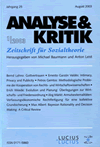Suchergebnisse
"Peter Koller"
Titel: Work and Social Justice
Autor: Peter Koller
Seite: 5-24
Abstract: In advanced societies, the sphere of work is subject to far-reaching changes which erode the system of gainful employment achieved in the second half of the last century, called ’typical work’, i.e. full-time employment for an indefinite period with collectively negotiated wages and working conditions. This development has lead to a proliferation of various kinds of ’atypical work’, most of which amount to poorly rewarded and insecure jobs with bad labour standards, and it has also weakened the traditional systems of social security. As a result, most advanced societies have experienced a significant increase in social inequality and poverty in recent decades, even though their overall social wealth has constantly grown, a state of affairs which may be deemed to be not merely undesirable, but also unjust. This judgment, however, presupposes a particular conception of social justice that submits the economic order and the working world to certain normative demands. The paper aims to illuminate these demands by proceeding in three steps. First of all, it starts with recapitulating the conditions of the rise of typical work and the features of its decay. Secondly, it seeks to sketch a conception of social justice and its requirements on the working world, on the basis of which the present situation may be considered as unjust. Finally, it will deal with the question of how to reform the present working world in a way that, as far as possible, meets the requirements of justice.
Titel: Ernst Tugendhat über Menschenrechte - Kontroverse Bemerkungen
Autor: Peter Koller
Seite: 115-119
Abstract: In this critical comment on Ernst Tugendhat's paper I dispute his view in two respects: the first refers to the concept, the second to the justification of human rights. As far as the concept of human rights is concerned, I argue that Tugendhat fails to notice that there are different kinds of human rights which are to be distinguished carefully. This conceptual failure prevents him from seeing that different human rights are justified by different reasons. While universal human rights can be justified by the principle of universalization, community rights are based on the demands of social justice.
Titel: Facetten der Macht
Autor: Peter Koller
Seite: 107-133
Abstract: Social power has many facets. This paper aims to illuminate some of these. First of all, it considers the general conceptual framework in which the concept of power is embedded. The author then elaborates on an analysis of the elementary concept of social power resulting in a proposal how to define power. Furthermore, the article deals with complex networks of power relations, namely constellations and structures of power. Another section focuses on some special aspects of the dynamics of power structures. Finally, the author discusses the problem of legitimation of power.
Titel: Zur Kritik der libertären Eigentumskonzeption
Autor: Peter Koller
Seite: 137-154
Abstract: Nozick's entitlement theory of justice is, besides Rawls's theory, one of the most widely discussed and intellectually most attractive conceptions within the field of contemporary political philosophy. Nozick's theory uses Locke's conception of the state of nature and of natural rights, and tries, starting from this point of view, to deliver a comprehensive systematisation of libertarian political ideals. This essay deals mainly with Nozick's conception of property rights. The argument is put forward that the concept of exclusive and unrestrictable ownership of which Nozick makes use, doesn,t find any acceptable justification on the basis of his theory.

The Relevance of Ideal Justice
2011 (33) Heft 2
Guest-Editors: Lukas Meyer / Pranay Sanklecha
Editorial
Whether and how normative theorising can be relevant for guiding people’s actions is one of the classical questions of moral and political philosophy. Platon’s dialogues Politeia, Politikos and Nomoi provide fascinating discussions on the topic. Recently normative theorists have investigated some aspects of these questions under the title of ideal and non-ideal theorising—relying on a distinction that Rawls introduced in A Theory of Justice (1971) and made use of in his The Law of Peo...

Work and Social Justice
2009 (31) Heft 1
Guest-Editor: Carsten Köllmann
Editorial
The labour market is among the most contested fields of political argument and conflict in our time. Public criticism of increasing wage inequalities and especially of excessive management pay is, notwithstanding its popularity, only a symptom of more fundamental changes going on in the labour market and in society at large. The conditions and the very meaning of work rank high on the agenda of Western societies. Persistent mass unemployment, coupled with an increasing number of working poor, co...